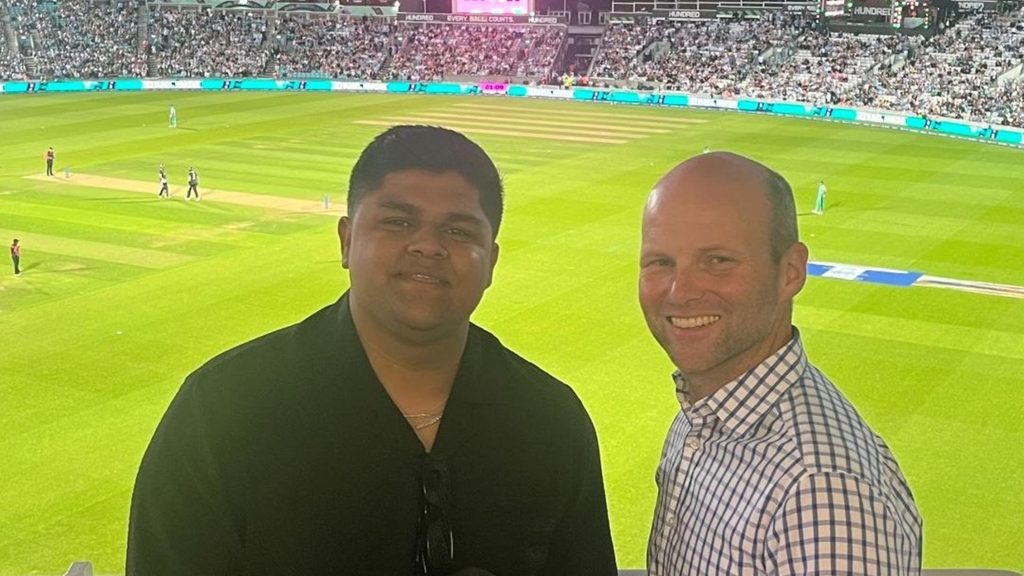Dubai, UAE (Oct 11, 2023)–Pakistan wicketkeeper-batter Azam Khan, one of the Desert Vipers Pakistani recruits for season two of the DP World ILT20, wants to use the tournament as a vehicle to force his way in his country’s plans for next year’s ICC Men’s Twenty20 World Cup.The power hitter, who has already played five T20 Internationals for his country – most recently in the United Arab Emirates against Afghanistan in March – is coming into the ILT20 off the back of success in the Caribbean Premier League as part of the winning Guyana franchise.And with that T20 World Cup set to take place in the same location as well as in the United States of America, Azam said he wanted to use the ILT20 to state his case for a return to that region with Pakistan.“I am really looking forward to that tournament (ICC Men’s T20 World Cup) because I have played in tournaments in the US and the Caribbean over the last three or four years, and I am quite aware about the conditions as well, so I think me being in the Pakistan (T20) team over the next year is very crucial for me,” he said.“I know I can dominate teams in the Caribbean as well because the conditions are spin-friendly. Some of the tracks are really good for batting, like Saint Lucia and Saint Kitts.“Outside of these two venues, the tracks are spin-friendly and the wickets are a bit slow. When I was playing for the Guyana Warriors, the Guyana pitch was slow and so you had to take your game deep until the last few overs and if you could have a three or four-run difference (ahead of the opposition) you could win games. You always get close encounters in the Caribbean. My radar is to be in the T20 squad (for Pakistan) for 2024 in the West Indies and I know I can go and dominate there.”Best known for his powerful hitting and massive sixes, Azam is one of three players from his country to join the Desert Vipers roster for season two of the DP World ILT20, along with leg-spinning all-rounder Shadab Khan and pace bowler Shaheen Shah Afridi.The son of former Pakistan captain Moin Khan, Azam was signed by the Desert Vipers for season one of the ILT20 but with the necessary permissions not forthcoming he was unable to take part.However, with the Pakistan Cricket Board this year releasing players to take part in the event in Dubai, Abu Dhabi and Sharjah Azam Khan will be able to don the colours of the Vipers, and he is thrilled at the opportunity.“It was quite easy for me to sign a contract with the Desert Vipers because I have played with many of the Desert Vipers players, (in franchises) across the world,” he said.“Tom Curran and Gus Atkinson played with me in the PSL (Pakistan Super League) along with Colin Munro, who is a great guy, and I have played with the players from the Caribbean like Sheldon Cottrell and Sherfane Rutherford in the CPL (Caribbean Premier League).“It (Desert Vipers) is a great team and last year they qualified for the final. This year they have added Shadab and Shaheen, and this is going to be a lethal combination for most teams (to face) in the (DP World) ILT20.”On the role of father Moin Khan, the former Pakistan captain and wicketkeeper, in his cricket career development:“My dad has been a great influence in my life. He is my biggest critic, and that is what I like about him. He is never satisfied with my performance, and he asks me to do much more every single day so I can be a better player and a better person. I have learnt a lot in my life, working under my dad. He is one of the biggest mentors in my life. My dad has played enough cricket for Pakistan, so he is able to tell me about every situation, and I can get that game awareness from him. He has been the primary example in my life so I can follow his steps and that is what I am doing by playing all over the world and enjoying my cricket.”On choosing to be a wicketkeeper, knowing he would always been compared to his father, who was also a wicketkeeper-batter for Pakistan:“People usually compare me with my dad because I am a wicketkeeper as well but, at the start of my career, I was a leg-spinner not a wicketkeeper-batter, and I used to bowl leg-spin and I would open the innings. My dad asked me to be a wicketkeeper-batter, and he used to train me in the garden in our house. He used to throw the ball to me, and I used to catch it with his wicketkeeping gloves on, so that is how I started keeping wicket.“Here I am now, playing all over the world as a wicketkeeper-batter. He has been a great influence and I am excited about the future and learning more from him.”On how he developed his batting style which is centred around power hitting:“I think my power game developed during the earlier part of my career. I was twelve or thirteen when I started playing hard ball cricket. In Karachi we play a lot of tape ball cricket, and when you play tape ball cricket you have to do power hitting because the bowlers are bowling so quickly that your hand speed must be really quick. That’s how I started developing my power hitting abilities and that is what I continued in my hard ball cricket as well. My dad told me that you have to be defensive sometimes, especially when you are playing in the longer format of the game, but for me in cricket it is all about scoring runs. Whether you are trying to attack the bowlers or being defensive, in the end as a batter you have to score runs. Whether you score a 30-ball hundred in a four-day or five-day match, you just have to score runs and that is what my game is all about and that is how I play.”On being known as a T20 player, and whether he has any ambitions of playing in the longer format:“I think four-day cricket teaches you a lot about the game and gives you game awareness. In Pakistan when I was playing four-day cricket I remember, in one season, for the first fifteen games we didn’t have any results. So, this teaches patience, and when you do not get results you try and do that extra work to try and win games. That is why I continue to play first-class cricket in Pakistan.“In the last two years I think I have played sixteen first-class games, and this has really helped me a lot in my white ball cricket as well. However, right now my primary focus is on white ball cricket because I know I can dominate teams in this format. I would like to continue playing the longer format as well in the future.”On spin not playing a major role in the inaugural DP World ILT20:“Pakistan used to play their home series in UAE, and spin has always been a key factor for the Pakistan team to win matches in Dubai. Even in the 2021 ICC Men’s T20 World Cup spin played a major role for Pakistan as their bowlers – and Shadab Khan and Imad Wasim – got wickets for the team at crucial times. So I was really surprised that only one wrist spinner – Wanindu Hasaranga – was able to get wickets in double figures in season one of the ILT20, because apart from Dubai, in Sharjah, where I played in a series against Afghanistan, the conditions were more spin-friendly, while in Abu Dhabi, where I played in the T10, the track was more batter-friendly.“I am looking forward to Shadab and Wanindu being on the same squad (Desert Vipers) and taking crucial wickets for us in the tournament.”On averaging hitting one six per game, having played over a hundred games, and how he prepares for it:“I think it is all about the practice. When I am back in Pakistan and do not have any tournaments on, I go to my dad’s academy and practice there. I go on the pitch and do my range hitting, and I have three or four people who can use the side arm device and I love to play with the side arm, especially when the spinners bowl to me. I try to dominate the spinners by hitting down the ground and that is what makes me more successful when playing spinners.“I used to get stats from my Islamabad United team analyst, who would send me all the stats about which fast bowlers and spinners I needed to work around. That made me change my game. In 2020 I was not doing very well against fast bowlers; I was averaging around 19 with a strike rate of 120. But in 2023 I dominated the fast bowlers as well, with an average of 35 and a strike rate of 160. My practice is what has helped me with my game, so the more you practice in the nets or ground, it will make you a much better player, and that is my approach.”On the size and weight of his bat:“When I was in the Caribbean (for the recent Caribbean Premier League), a lot of the guys wanted to use my bats, and I offered them the chance to take any bat from my bag, but when they tested the bats their reaction was that the bats were too heavy for them. I play with a 2’14” (two pounds, fourteen ounce) or 2’15’ (two pounds, fifteen ounce) bat. I cannot work with a lighter bat because then I feel like I am playing tape ball cricket. I usually use a heavier bat so even if I mistime a shot it can clear the ropes. That is my thinking on bats.”On his role in the Desert Vipers squad in season two of the DP World ILT20:“I think I am clear about my role which is to go out and take on the bowlers. That is how I have played throughout my career of three years. That suits me the best, to go out and dominate the best bowlers of the (opposition) team. If you dominate the best bowlers of the other team, their morale goes down because they know he (the batter) has hit boundaries off their best bowlers, plus they do not have many options then. That is what I am expecting for season two of the ILT20, where I will try and give my best for the team. I just want to be the champion of the UAE as well. I was quite sad when the Desert Vipers finished as runners-up last season since they were favourites, but this year I will do my best to help them be champions.”On his role as a batting finisher:“If you are a true professional, you must bat at any number. Even if my team wants me to bat at number nine or number ten, I would be happy with that because, for me, performance is key. You have to perform if someone is believing in you so much. My role is as a finisher and that is what I did in the Caribbean Premier League. Early in that tournament I was going in at number four and I was not that comfortable, but once I went out as a finisher my performance improved and the role of a finisher suits my game very much.”On Shaheen Shah Afridi and Shadab Khan being wonderful additions to the Desert Vipers squad:“I am quite excited to be with Shadab and Shaheen once again. I have played with them in the Pakistan team, and I think both of them offer a great combination. Shadab can bat higher up the order as well, and him bowling leg-spin in the middle overs helps to get crucial wickets for the team. He (Shadab) is the first Pakistani bowler to get 100 Twenty20 International wickets. Speaking of Shaheen Afridi, I think he is one of the best bowlers in the world right now, and especially when bowling with the new ball he is quite lethal. I am sure that most of the teams will be looking for ways to play him (especially) in the first six overs. I am quite excited about it.”On whether the inclusion of Pakistani players gives the Desert Vipers an added advantage over the other teams in the league:“I think it (the inclusion of Pakistan players) will give a head start to the Desert Vipers, seeing that both Shadab and Shaheen have played a lot of cricket in the UAE. It means they are quite aware of the conditions, and they can give all the details about all the grounds to the other players. So that is a great advantage.“Having Shaheen Shah Afridi will be a big advantage, because most of the batters are quite afraid of facing him with the new ball. When I play Shaheen with the new ball, I usually would ask him not to bowl me the inswingers because I know he would crush my toes. I think he is going to bowl a lot of toe crushers in the ILT20, and I am excited to see that.”On looking forward to working with the coaching staff at the Desert Vipers, especially Head Coach James Foster a former England wicketkeeper, batting coach Neil McKenzie and seam bowling coach Azhar Mahmood:“I have never worked with James Foster before, but last year I had a chat with him during the PSL (Pakistan Super League) and he was upset I did not get the NOC (No Objection Certificate) to play for the Desert Vipers (in season one). He told me that I would have enjoyed the experience. So I am really looking forward to working with him and all the other coaches. They (coaches) are the best in the game so they will be able to tell me about the conditions and about my work. I would also like to mention Azhar Mahmood, the bowling coach at Desert Vipers, who I have worked with in the past at Islamabad United and I have a great bond with him.”On the Desert Vipers sustainability agenda:“I think it is a great initiative and a great step. I cannot wait to join the team and get to know everyone and show my skills and perform and play good cricket.”The second edition of the ILT20 is scheduled to start in January 2024. The Desert Vipers finished as runners-up in the inaugural edition of the tournament in January and February 2023.Among the players the Desert Vipers have retained from that first edition are English opening batter Alex Hales, who scored the competition’s first-ever individual hundred and finished as its leading run-scorer, and Wanindu Hasaranga, the Sri Lanka wrist-spinner, the top wicket-taker in the past two editions of the ICC Men’s T20 World Cup.
Pakistani power hitter Azam Khan announces his goals for season two of the DP World ILT20






